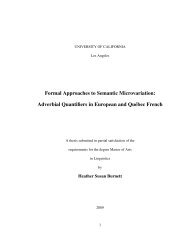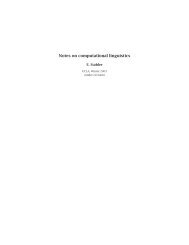Post Verbal Subjects and Agreement in Brazilian Portuguese
Post Verbal Subjects and Agreement in Brazilian Portuguese
Post Verbal Subjects and Agreement in Brazilian Portuguese
You also want an ePaper? Increase the reach of your titles
YUMPU automatically turns print PDFs into web optimized ePapers that Google loves.
to be some additional mechanism of default agreement, expla<strong>in</strong><strong>in</strong>g both the fact<br />
that the verb surfaces with third person s<strong>in</strong>gular agreement <strong>and</strong> the fact that the<br />
derivation does not crash due to unvalued features <strong>in</strong> T.<br />
Such an account would have to resolve a number of complications. For<br />
example, the availability of both a bare structure <strong>and</strong> a more articulate structure<br />
(conta<strong>in</strong><strong>in</strong>g a Phase boundary between T <strong>and</strong> v) only for unaccusatives <strong>and</strong><br />
existentials would call for an explanation. Another factor to be expla<strong>in</strong>ed would be<br />
the availability of default agreement as a possible rescue only with unaccusatives<br />
<strong>and</strong> existentials:<br />
(104) a. Chegou as men<strong>in</strong>as.<br />
b. [expl T-arrive(DEFAULT:3sg) [(…)the girls]]<br />
(105) a. Trabalhou as men<strong>in</strong>as.<br />
b. [expl T-arrive(DEFAULT:3sg) [(…)the girls]]<br />
The account for copular cases would probably be different <strong>in</strong> nature, as be<br />
would differ from unaccusatives <strong>and</strong> existentials <strong>in</strong> this framework, <strong>in</strong> that only the<br />
latter would have a small clause complement.<br />
The Subject-copular-predicate order could be ord<strong>in</strong>arily addressed: T would<br />
probe the subject (the closest match<strong>in</strong>g goal), trigger<strong>in</strong>g subject agreement. The<br />
EPP would be satisfied by rais<strong>in</strong>g of the subject to Spec-TP. The fact that the same<br />
DP that Agrees with T raises to spec-TP is consistent with the requirement,<br />
proposed <strong>in</strong> Chomsky (2001: 15) that as many features as possible should be<br />
checked when match<strong>in</strong>g occurs (‘maximize match<strong>in</strong>g effects’).<br />
44

















